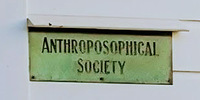Anthroposophy in Hawkes Bay
Calendar of Coming Events
-- Diary Dates
In the Rudolf Steiner Centre, 401 Whitehead Road, Hastings
unless stated otherwise.
- Saturday 7 June. 7 pm. *Festival for the Dead.
- 6pm Friday June 13 from 6pm to 1 pm Sunday June 15. **Weekend Courses for Eurythmic Exercises at Taruna.
- Saturday 28 June. Winter Festival
~~~~~~~~~~~~~~~~~~~~~~
Festival for the Dead
This is an opportunity for us to remember people who have crossed the threshold of death.
We are looking for extra singers to help us with presenting "The Dream Song of Olaf Asteson"
If you are interested in helping out with this artistic endeavour please contact John Jackson [022-1228002] soon - as practice time is running out.
This will be presented in a candle-lit setting and will be performed after a talk by David Urieli on the journey after death.
You can find out more about the Norwegian mystic who slept through the thirteen days and holy nights of Christmas in:
Olaf Asteson a 1914 lecture bt Rudolf Steiner.
~~~~~~~~~~~~~~~~~~~~~~~~~~~~~~
-- Regular Groups
- Leaders of Regular Study Groups are invited to list what your group is doing, when and where and how those interested can join you. Details to info@anthrohb.nz
- Friday Leading Thoughts Study Group meets on 2nd and 4th Friday of the month at 7 pm in the Foyer. All Welcome. Next meeting: Fri 23 May: p167 "What is the Earth in reality within the Macrocosm?"
~~~~~~~~~~~~~~~~~~~~~~~~~~~~~~~~~~~~~~~
Weekend Courses for Eurythmic Exercises
We invite you to explore with us the importance of this movement therapy and share insights into movement as a modern means of healing and aid in the self management of the imbalances in our well-being.
Rudolf Steiner’s series of eight lectures on curative eurythmy in 1921 and 1922, forms the foundation of our course,
Dr Richard Drexel, Dr Helen Proctor and Sue Simpson will lead the workshop.
Some prior knowledge of eurythmy is highly recommended and would be an advantage, but is not a prerequisite. All are welcome.
Dates: 6pm Friday June 13th to 1 pm Sunday June 15th 2025 and 6pm Friday 3rd Oct to 1pm Sunday 5th Oct 2025
Location: Taruna, 33 Te Mata Peak Road, Havelock North.
Course fee $285 / weekend. Discount: $500 for both courses
For registration and enquiries, please contact Jonathan White at jw021320850@gmail.com.
We look forward to your participation with interest.
Helen, Richard and Sue Simpson
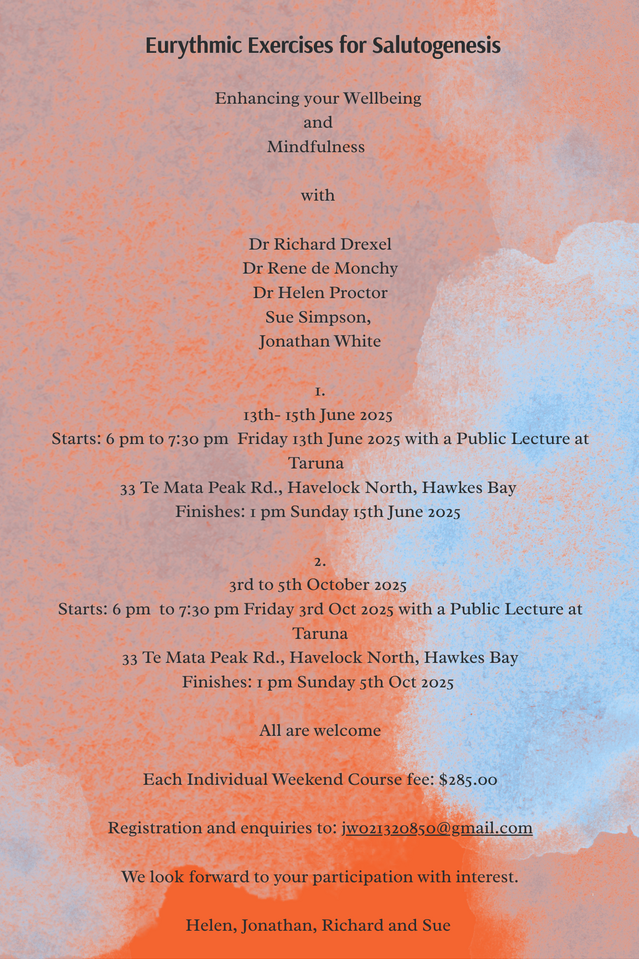
~~~~~~~~~~~~~~~~~~~~~~~~~~~~~~~~~~~~~~~~~~~~~~~~~~~~~~~~~~~~~~~~~~~~~~~~~~~~~~
Committee Meetings: Monthly, second Thursday from 5:30 pm allowing up to 2 hours.
Next meeting Thursday 12 June 5.30pm
Over the next weeks the members of the Committee will introduce themselves with a brief Bio in the Newsletter. This week John Jackson introduces himself.
^^^^^^^^^
John Jackson
"I was born in Hawkes Bay and was one of the early students of Queenswood School (after its change from a Preparatory School for Girls into a Waldorf School) for my primary schooling.
My secondary schooling at Napier Boys high woke me up to the differences in cultures between the two schooling methods and caused me to ask questions.
I found Steiner first through reading Theosophy of the Rosicrucian’s when in my late teens and entered a phase of wanting to know as much about Steiner as I could.
I spent a year at Sothern Star Abbey near Ormondville, CHB, as a cadet helping the monks to run the large sheep and cattle farm there. I was there the year (1978) that Francis Edmunds visited Taikura. The monks knew a little about Steiner.
In my 20’s I started a slow study of speech formation finally joining Gradalis College in 1991. This enabled me to deepen my study of Anthroposophy and learn an art. This complemented my building skills.
In the mid 90’s I went to Dornach and joined the youth conference and volunteered at the Goetheanum.
I was encouraged to learn German by working in a Camphill village near Lake Konstance in the south of Germany. There I met Christine – we married in the Lehenhof Camphill community,
I was lucky to be part of the renovation of the Goetheanum great hall in 1997, a great experience for me.
I continued my study of speech and drama at Peredur School of the Arts in East Grinstead, UK and graduated after performing the role of Capiesus in RS’s second mystery drama, the Soul's Probation.
I then spent 5 years working in Glencraig, a Camphill community in Northern Ireland, until 2006
Since 2007, I have been working at Hohepa in both the School and Adult communities as therapist, teacher and teacher aide. My interests are in celebrating the Festivals.
I have been a Trustee of the Branch for 8 years and a member of the Committee since 2023."
~~~~~~~~~~~~~~~~~~~~~~~~
Foyer Chairs
Following a request at our AGM, the Committee have searched for better chairs in the Foyer. Many thanks to Gerrit and Bernie for their good work in finding a set of chairs - see photos below - that are both attractive and comfortable -- and also very reasonably priced . Thank you to people who donated or purchased the previous chairs which have given many years of service and are now destined for different homes.
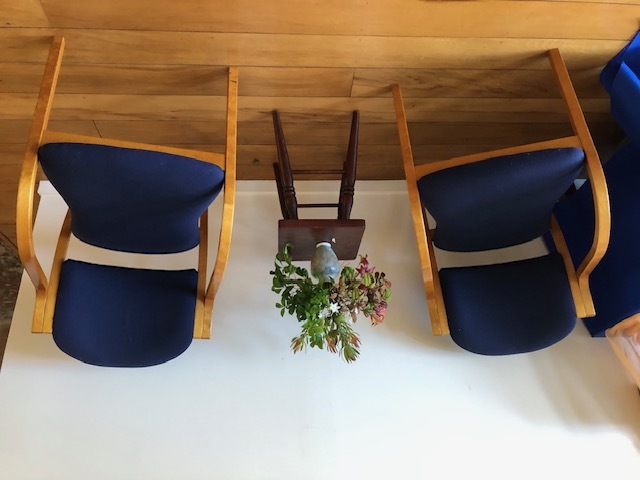
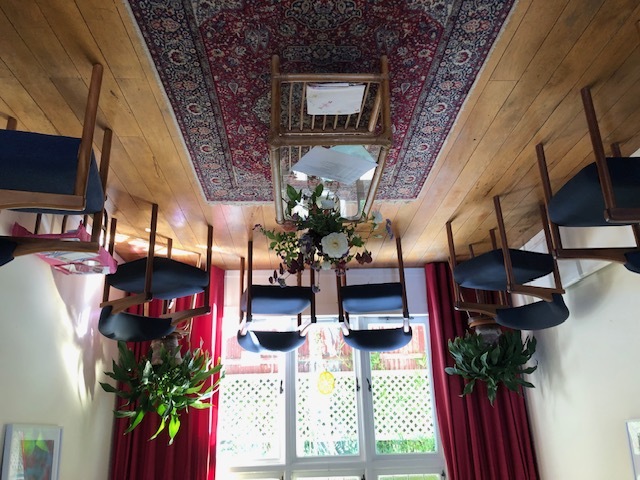
~~~~~~~~~~~~~~~~~~~~~~~~~~~~~~~~~~~~~~
Inaugural Conference of the Agriculture Section Branch in Australia
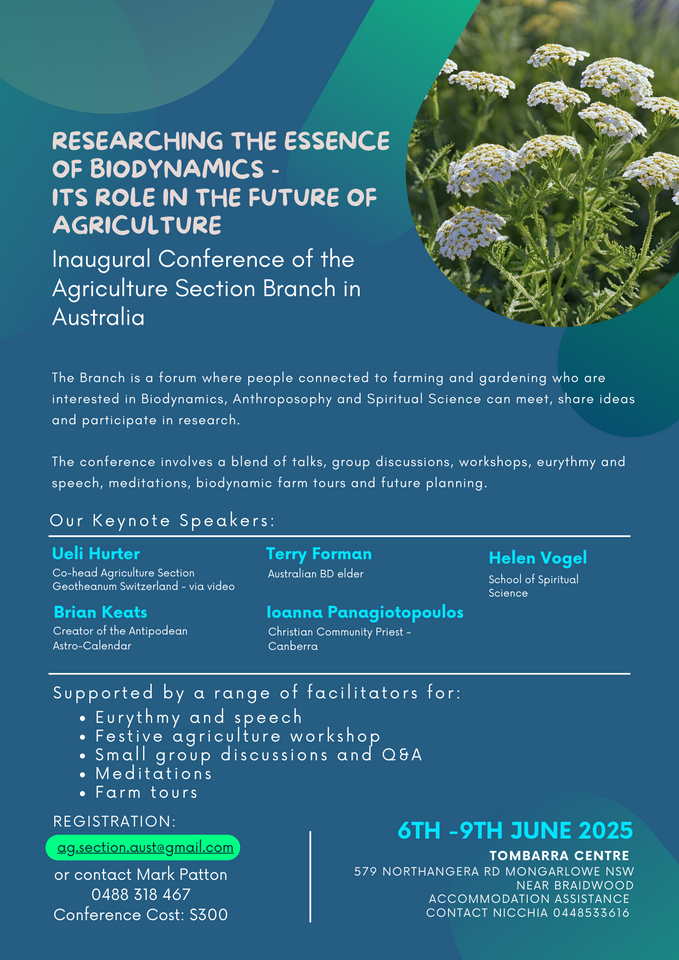
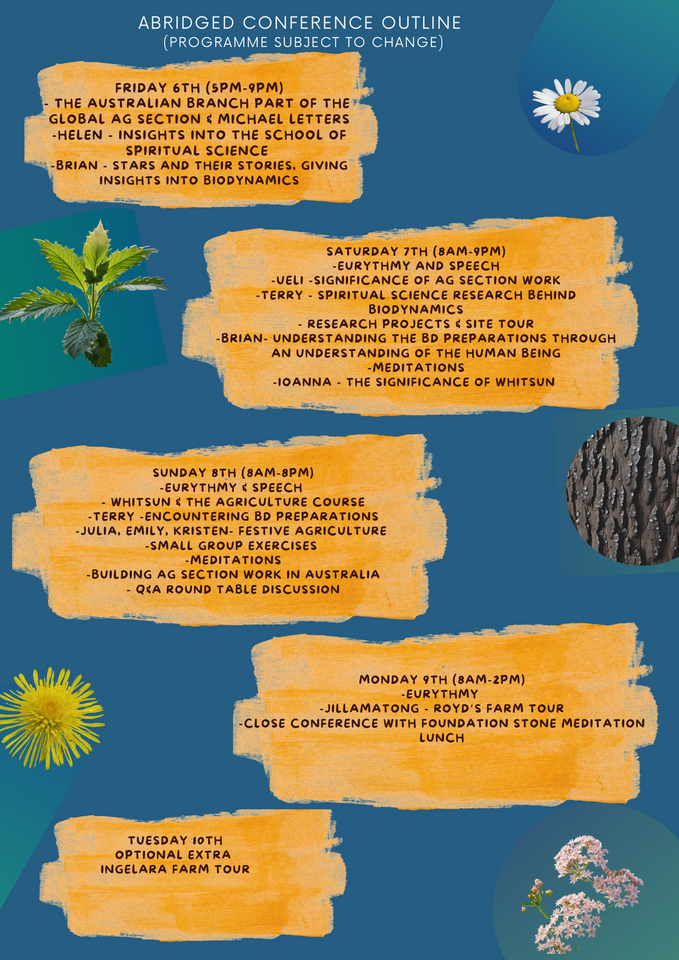
COMMUNITY NOTICEBOARD:
Requests; Exchange; Wanted; For sale
Notice requests to info@anthrohb.nz ~~~~~~~~~~~~~~~~~~~~~~~~~~~~~~~~~~~~~~~~~~~~~~~~~~~~~~~~~~~~~~~~~~
The Character of Threefold Social Life
When Rudolf Steiner originally described a Threefold Social Life, he did not have a political agenda, but an educational one – to draw people’s attention to three types of human social life. Humans are spiritual beings incarnated into physical bodies for a limited time with a cohort of fellow travellers who evolve and develop by means of their social life.
A person could be pursuing his own thoughts, interacting with friends, neighbours or colleagues and/or using talents to create something for someone else, be it a ‘good’ or a ‘service’.
Our activities can be: Inward – between – outward.
Much of our inward activity is in the category of self-development or education, developing knowledge, talents, skills and awareness.
- The essence of science is acquiring knowledge of both oneself and other things in one'sexperience.
Criteria: Is what I know ‘true’?
- The essence of art is self-expression and the exploration of relationships between such things (mainly sense-perceptible, but with a spiritual overtone) as colours, forms, musical tones, activities and architectural space, straight and curved, concave and convex, taste and texture, friends and enemies…. In any art that you are involved in – what are the relationships that you engage with?
Criteria: Is what I express ‘beautiful’?
- The essence of religion is discovering what you believe is most important in your existence. It can express itself through your conscience, ‘the small voice within’. Not always so small! This is a guide to your will, to what you do, how you act in the world.
Criteria: Is what I do ‘good’? (of God)
This element of Social Life might be called the Spiritual Cultural realm. A key condition is FREEDOM. This means that the only constraint imposed on your actions is what you apply to yourself without outer coercion.
*****
Much of our ‘between’ activity is in the category of relationships: our relationship to everything around us – people, animals, plants and inanimate things.
In our relationships, do we have a feeling of pride, or ownership, of respect or disregard, of admiration or hatred, of agreement or disagreement, and so on. Here we need to be mindful of how what-we-do, how our actions may affect others.
A typical form of a between activity is Conversation: Listening and Speaking – a form of soul breathing. How do we determine who speaks and who listens? Is this not a matter of feeling?
What should happen when a conflict arises between two people or two groups of people, or between nations? Do we ignore it – turn a blind eye? When we are children, parents may help us sort our social problems in a harmonious way. In school, teachers may establish Rules, but children who are sensitive and those adversely affected may well protest if rules are not fair: "That's not FAIR!"
In adult society, how do we establish Fair Rules or Laws?
What Rights and Responsibilities do people have? Should rich or wealthy people or of a certain caste have more rights than others? In 1948 the United Nations published a Universal Declaration of Human Rights. I am still waiting for their Universal Declaration of Human Responsibilities!
Anyway: in our own minds: What are the Rights and Responsibilities of ownership? What is the difference between Ownership and Stewardship? Can we 'own' land? What does it mean 'to own land'? What is the difference between owning a house and owning land, the land a house is built on?
Do we give or grant Rights to others to act in our domain? Or do we demand rights to act in their domain? Do we take or accept Responsibility for actions? Or do we blame others when things go wrong?
Can people be equal before the law? Should Prince and Pauper be treated equally? If so, WHY? WHO has the authority to reward or penalize someone else? Who gives them that authority?
There are many forms of social rule creation depending on history, circumstance or situation: Who decides what the rules for a realm or an element of society should be?
"Parentocracy "– rule of children by parents.
"Teacherocracy" – rule of pupils by teachers.
Ochlocracy – rule of a crowd by a mob (mob rule as in French Revolution).
Autocracy – rule of oneself by oneself [self rule].
Epistocracy – rule by knowledge (the wise?)
Aristocracy – rule of a fiefdom or state by nobility (however nobility is determined).
Plutocracy – rule of the poor by the wealthy.
Anarchy – no rule at all
Oligarchy – rule of many by a few.
Monarchy – rule of all - a kingdom or empire - by one (a king or emperor).... [or a totalitarian Dictator??]
Democracy - rule by, of and for the people.
Representative Democracy – rule of the whole population by representatives elected by a majority of enfranchised citizens. (Is there a problem here of the tyranny of the majority?)
What is appropriate now for us here? What do we hope might evolve for our time, under the aegis of Archangel Michael?
This element of Social Life might be called the Social Political realm. A key condition is FAIRNESS. This is most likely to be achieved when people are regarded as equals and can meet face-to-face.
*****
The realm where our work is outward – done purely for the benefit of others, not for oneself – may be called the Economic Productive realm. Here the skills and talents we developed during our education are put to 'good' use. There are 3 aspects: Production, Distribution, Consumption. [Creation – Sharing – Destruction, Birth – Life – Death.]
Decisions in this realm have their own quality. They are best made, I think, by experts who are knowledgeable who consult with other knowledgeable people before making a decision. Teams of people collaborate with good will. They are not best made by plutocrats (owning corporations) seeking personal (egotistical) benefits or more wealth.
A key condition for this realm, I feel, is FELLOWSHIP in the form of cooperation, where people work side-by-side to achieve a common goal.
Note that this is not the realm for determining salary or recompense. The question “What is a fair recompense in relation to the time and energy expended?” is one for the Social Political realm to consider.
Next time we may consider: How should a group or person be given the authority to make a decision that affects the lives of (many) other people?
FREEDOM == FAIRNESS == FELLOWSHIP
RB
